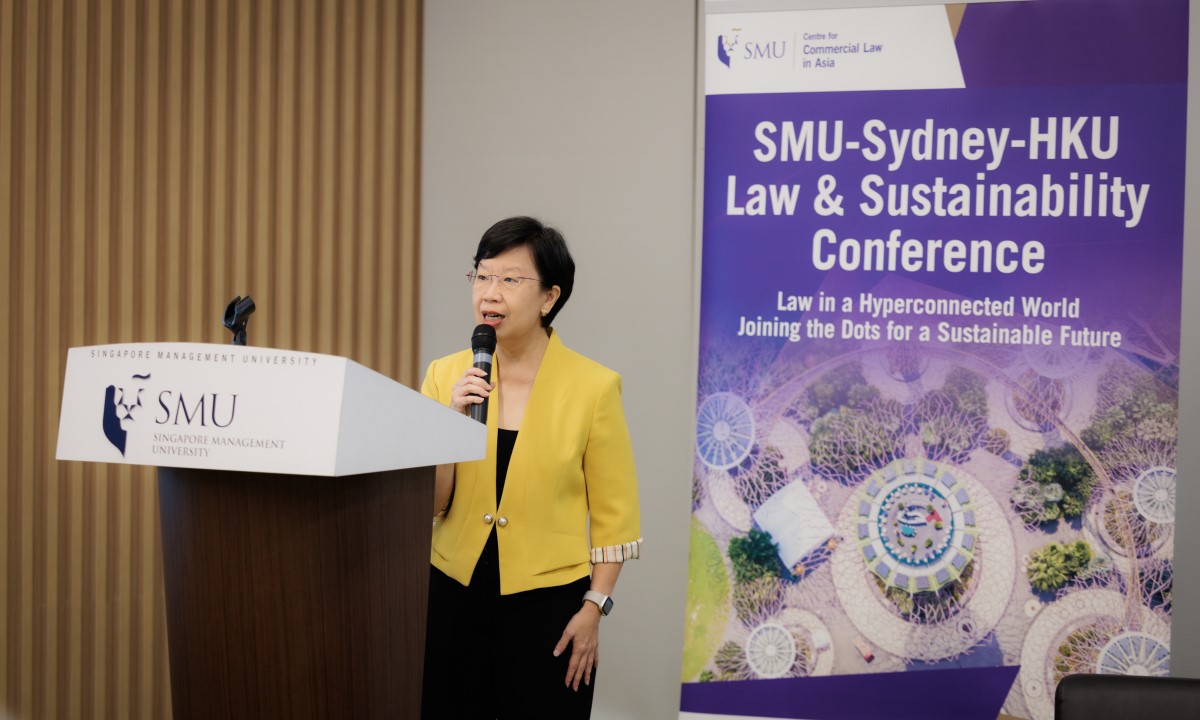Marking the start of the SMU Sustainability Series 2023 with a conference and research alliance

On 13 July 2023, SMU’s Yong Pung How School of Law (YPHSL) announced the formation of the Asia-Pacific Research Alliance on Law and Sustainability alongside the University of Sydney’s (USyd) Sydney Law School, and The University of Hong Kong’s (HKU) Faculty of Law.
This research alliance aims to drive law-focused research and teaching initiatives on achieving sustainability in the Asia-Pacific region and is the first of its kind in this region.
This new partnership was announced at the inaugural Law and Sustainability Conference, titled “Law in a Hyperconnected World – Joining the Dots for a Sustainable Future”, the first of a three-part conference series, as well as a starting point for the Research Alliance. The conference saw more than 50 speakers from across the world come together to discuss their research on various topics relating to law and sustainability issues.
This also marks the first event of many planned for the SMU Sustainability Series 2023, which will run from July to October 2023. The curation of events focused on the topic of sustainability will be a means through which SMU intends to engage with stakeholders and partners to further the discourse on sustainability, as well as to showcase key milestones in the university’s sustainability blueprint that have been achieved so far.
Law and its role in sustainability efforts
Welcoming all attendees to the conference, SMU President Professor Lily Kong started by setting out the objective of the platform – that hopefully will kickstart discussions on how to harmonise economic progress with ecological well-being, and the place of governance and law in these endeavours.
“Through keeping our gaze on environmental concerns, legal and governance frameworks, the conference demonstrates the richness of insight from analyses that derive from interdisciplinary thinking,” she explained.
“Such insights set the stage for the development of new legal frameworks and governance systems that address the unprecedented social and ecological disruptions we face today.”
The role of law in addressing sustainability issues was further touched upon by Singapore’s Ambassador-at-Large, Professor Tommy Koh, who was the conference’s Guest-of-Honour. In his speech, Prof Koh brought up the ongoing Climate Crisis, and shared some examples of how law has been and is being used to promote sustainability and protect the environment.
Especially poignant among the examples highlighted by Prof Koh was the story of the Vanuatu ICJ Initiative, which began with a group of law students.
By persuading their government to make a proposal at the United Nations in New York, Vanuatu ended up leading a coalition of 132 countries, including Australia and Singapore, at the UN General Assembly, asking the International Court of Justice for an advisory opinion on the obligations of the United States of America to protect the rights of present and future generations against the adverse effects of climate change.
“The application to the ICJ for an advisory opinion is unprecedented. All of us who are both international lawyers and environmentalists look forward to the oral hearing which will take place this autumn at the court at the Hague,” said Prof Koh.
The conference opening was followed by the first plenary which was chaired by SMU’s Associate Professor of Law Liu Nengye. The plenary began with a keynote address by Dr Lena Chan, Senior Director of the International Biodiversity Conservation Division at Singapore’s National Parks Board, who shared many interesting insights into the rich biodiversity of flora and fauna on the island city, as well as how law plays an integral and crucial role in the global sustainability movement. What followed was a lively discussion facilitated by Associate Professor Liu involving Dr Chan and academics from all three law schools
The critical role played by universities in sustainability education formed the focal discussion in the next plenary session which was chaired by SMU’s Associate Professor of Law Michelle Lim and involved leaders of the three universities – SMU’s Prof Kong, USyd’s Associate Dean Education Professor Nicole Graham, and HKU’s Head of Department of Law Professor Zhao Yun.
Representatives from civil society and the private sector also weighed in on the topic via an industry panel chaired by Assistant Professor of Law Stefanie Schacherer. Personnel from WongPartnership, Johnson Controls, Musim Mas Group and World Wide Fund for Nature Singapore shared their perspectives on sustainability and ESG in business, finance, legal practice and governance.
Following the two-day Conference, the Alliance will be producing in 2024 a Special Issue with some dozen papers to be published by Review of European, Comparative and International Environmental Law, one of the top journals in the field.
This multi-university collaboration is timely. Despite the pressing global challenges that we are facing, legal systems at both the international and domestic levels have remained entrenched in the generations during which they were formed. “It is therefore crucial for scholars and policymakers to envision new legal and governance systems that recognise the interconnectedness of multiple sectors, anticipate the far-reaching effects of global environmental change, and address the unprecedented social and ecological disruptions we face today,” highlighted Dean of SMU YPHSL, Professor Lee Pey Woan.
New Sustainability Law elective for law undergraduates
Recognising that sustainability law goes beyond environmental law, and to allow SMU’s law students to gain exposure to a range of current developments locally and globally, she announced that YPHSL will, in January 2024, introduce a new Sustainability Law elective for all law undergraduates. The course aims to familiarise students with the environmental, economic, and social dimensions and intersections, for sustainability and various streams of law and policy.


